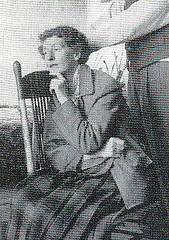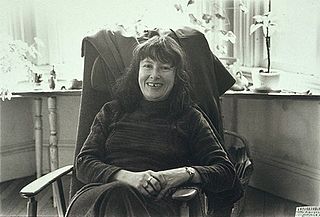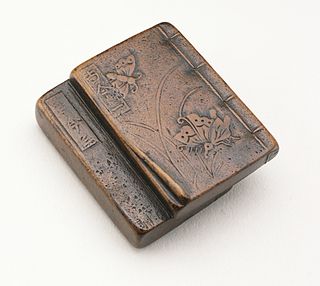
Prose poetry is poetry written in prose form instead of verse form while otherwise deferring to poetic devices to make meaning.
The Objectivist poets were a loose-knit group of second-generation Modernists who emerged in the 1930s. They were mainly American and were influenced by, among others, Ezra Pound and William Carlos Williams. The basic tenets of objectivist poetics as defined by Louis Zukofsky were to treat the poem as an object, and to emphasize sincerity, intelligence, and the poet's ability to look clearly at the world. While the name of the group is similar to Ayn Rand's school of philosophy, the two movements are not affiliated.

Charles Reznikoff was an American poet best known for his long work, Testimony: The United States (1885–1915), Recitative (1934–1979). The term Objectivist was coined for him. The multi-volume Testimony was based on court records and explored the experiences of immigrants, black people and the urban and rural poor in the United States in the late nineteenth and early twentieth centuries. He followed this with Holocaust (1975), based on court testimony about Nazi death camps during World War II.

George Oppen was an American poet, best known as one of the members of the Objectivist group of poets. He abandoned poetry in the 1930s for political activism and moved to Mexico in 1950 to avoid the attentions of the House Un-American Activities Committee. He returned to poetry—and to the United States—in 1958, and received the Pulitzer Prize for Poetry in 1969.

Madeline Gleason was a United States poet and dramatist. She was the founder of the San Francisco Poetry Guild. In 1947, she became the director of the first poetry festival in the United States, laying the groundwork for what became known as the San Francisco Renaissance. She was, with Helen Adam, Barbara Guest, and Denise Levertov, one of only four women whose work was included in Donald Allen's landmark anthology, The New American Poetry 1945-1960 (1960).

The Black Mountain poets, sometimes called projectivist poets, were a group of mid-20th-century American avant-garde or postmodern poets centered on Black Mountain College in North Carolina.

Priscilla Denise Levertov was a British-born naturalised American poet. She was heavily influenced by the Black Mountain poets and by the political context of the Vietnam War, which she explored in her poetry book The Freeing of the Dust. She was a recipient of the Lannan Literary Award for Poetry.

Paul Blackburn was an American poet. He influenced contemporary literature through his poetry, translations and the encouragement and support he offered to fellow poets.

The New American Poetry 1945–1960 is a poetry anthology edited by Donald Allen and published in 1960. It aimed to pick out the "third generation" of American modernist poets, and included quite a number of poems fresh from the little magazines of the late 1950s. In the longer term it attained a classic status, with critical approval and continuing sales. It was reprinted in 1999. As of 2024, Edward Field and Gary Snyder are the only contributors still living.

Japanese poetry is poetry typical of Japan, or written, spoken, or chanted in the Japanese language, which includes Old Japanese, Early Middle Japanese, Late Middle Japanese, and Modern Japanese, as well as poetry in Japan which was written in the Chinese language or ryūka from the Okinawa Islands: it is possible to make a more accurate distinction between Japanese poetry written in Japan or by Japanese people in other languages versus that written in the Japanese language by speaking of Japanese-language poetry. Much of the literary record of Japanese poetry begins when Japanese poets encountered Chinese poetry during the Tang dynasty. Under the influence of the Chinese poets of this era Japanese began to compose poetry in Chinese kanshi); and, as part of this tradition, poetry in Japan tended to be intimately associated with pictorial painting, partly because of the influence of Chinese arts, and the tradition of the use of ink and brush for both writing and drawing. It took several hundred years to digest the foreign impact and make it an integral part of Japanese culture and to merge this kanshi poetry into a Japanese language literary tradition, and then later to develop the diversity of unique poetic forms of native poetry, such as waka, haikai, and other more Japanese poetic specialties. For example, in the Tale of Genji both kanshi and waka are frequently mentioned. The history of Japanese poetry goes from an early semi-historical/mythological phase, through the early Old Japanese literature inclusions, just before the Nara period, the Nara period itself, the Heian period, the Kamakura period, and so on, up through the poetically important Edo period and modern times; however, the history of poetry often is different from socio-political history.

David Lehman is an American poet, non-fiction writer, and literary critic, and the founder and series editor for The Best American Poetry. He was a writer and freelance journalist for fifteen years, writing for such publications as Newsweek, The Wall Street Journal, and The New York Times. In 2006, Lehman served as Editor for the new Oxford Book of American Poetry. He taught and was the Poetry Coordinator at The New School in New York City until May 2018.
Barbara Moraff is an American poet of the Beat generation living in Vermont.

Jimmy Santiago Baca is an American poet, memoirist, and screenwriter from New Mexico.
American Poetry Since 1950: Innovators and Outsiders is a 1993 poetry anthology edited by Eliot Weinberger. First published by Marsilio Publishers, it joined two other collections which appeared at that time: From the Other Side of the Century: A New American Poetry, 1960-1990 and Postmodern American Poetry, a 1994 poetry anthology edited by Paul Hoover. These three anthologies were perhaps seeking to be for their time what Donald Allen's anthology, The New American Poetry, was for the 1960s.
A poetic journal is a literary genre combining aspects of poetry with the daily, or near daily, "takes" of journal writing. Born of twin impulses: to track change in daily life and to memorialize experience, poetic journals owe allegiances to Asian writing — particularly the Japanese haibun of Matsuo Bashō, The Pillow Book of Sei Shōnagon, and the poetic diaries of Masaoka Shiki — as well as Objectivist poets and others associated with Donald Allen's anthology The New American Poetry 1945-1960. Unlike traditional diaries or journals that focus primarily on recounting a day's experience, poetic journals emphasize the act of writing itself in collaboration with the day's account. Taking its cue from post-Jack Kerouac writers, like Bernadette Mayer and Clark Coolidge, the poetic journal aims to be all-inclusive as well as timely and attentive. To quote Tyler Doherty in his introduction to For the Time Being: The Bootstrap Book of Poetic Journals, "[The poetic journal] doesn't try to tell us what the world is, so much as remind us that the world is."
Paul Randolph Violi was an American poet born in Brooklyn, New York. He is the author of eleven books of poetry, including Splurge, Fracas, The Curious Builder, Likewise, and most recently Overnight. Violi was managing editor of The Architectural Forum from 1972–1974, worked on free-lance projects at Universal Limited Art Editions and as chairman of the Associate Council Poetry Committee, he organized a series of readings at the Museum of Modern Art from 1974 to 1983. He also co-founded Swollen Magpie Press, which produced poetry chapbooks, anthologies, and a magazine called New York Times. His art book collaborations with Dale Devereux Barker, most recently Envoy; Life is Completely Interesting, have been acquired by major collections. The expanded text of their first collaboration, Selected Accidents, Pointless Anecdotes, a collection of non-fiction prose, was published by Hanging Loose Press in 2002.

Joanna Furhman is an American poet and professor. She is the author of six collections of poems and her poems have appeared in literary magazines and journals, as well as in anthologies. Fuhrman is a member of the Alice James Books Cooperative Board, and poetry editor for Boog City, a community newspaper for the Lower East Side in New York.
Dick Lourie (1937) is an American poet, editor, and musician and the author of eight books, with the most recent as of 2023 being Jam Session.
Sharon Mesmer is a Polish-American poet, fiction writer, essayist and professor of creative writing. Her poetry collections are Annoying Diabetic Bitch, The Virgin Formica, Vertigo Seeks Affinities, Half Angel, Half Lunch and Crossing Second Avenue. Her fiction collections are Ma Vie à Yonago, In Ordinary Time and The Empty Quarter. She teaches in the undergraduate and graduate programs of New York University and The New School. She has lived in Brooklyn, New York since 1988 and is a distant relative of Franz Anton Mesmer, proponent of animal magnetism and Otto Messmer, the American animator best known for creating Felix the Cat.
Patricia Traxler, winner of the 2019 Kansas Book Award in Poetry, is an American poet, essayist, and fiction writer who lives in Salina, Kansas. She is the author of four volumes of poetry, a novel, and a short story collection. Born and raised in San Diego, California, one of eight children in a working-class family, Traxler was much influenced by her maternal grandmother, Nora Dunne, a poet from County Cork, Ireland, who lived with the family for several years during Traxler’s childhood.











